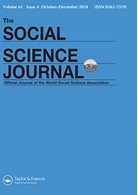Fialová, Kamila. 2024. „Understanding precautionary savings behaviour: Insights from Czechia“. The Social Science Journal. ISSN 0362-3319. Available from: https://doi.org/10.1080/03623319.2024.2424639
The article provides a comprehensive analysis of precautionary savings across several dimensions. Using data from a survey of Czech households, it identifies the primary factors influencing whether households possess precautionary savings and save regularly, their subjective perception of the optimal level of precautionary savings, and the discrepancy between this perceived optimum and their actual savings. Findings highlight the crucial effect of household income, and the way households make ends meet that shape precautionary savings behaviour, with financial strain having an adverse impact across all the examined dimensions. Low-income households are not less likely to possess any precautionary savings; however, they struggle to save regularly and to maintain a sufficient savings buffer. Additionally, these households do not necessarily encounter greater difficulties in aligning their savings with their perceived optimal level due to a lower conceptualisation of optimal precautionary savings. Ownership of a savings account positively impacts precautionary savings, whereas credit instruments disfavour it.
Authors
Department
Topics
Economy, Wages and Incomes, Social Inequalities
